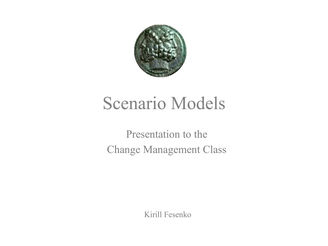Scenario Models. Presentation to the Change Management Class. Kirill Fesenko, 2005
Scenario Models: Creating and Using Scenarios for the Educational Institutions and Libraries |
| Presentation to the Change Management Class |
| Kirill Fesenko |
|
The image that I chose for this presentation is the one of Janus, Roman god of doors. I came across We covered scenarios during our October 9th session with Dr. Flowers, which I think was very interesting, I would like to present three scenario models which can be used depending on your goals for the scenario |
| On this slide I just wanted to briefly remind you of what scenarios are. You can find many definitions of scenarios in the literature but I picked up just several points from the Hannabuss’s article to illustrate different aspects of scenarios. |
|
Scenarios (1) 1.“Scenarios are plausible stories about alternative futures” 2.“Scenarios are attempts to learn from the future 3.“Scenarios can deal with the global and strategic 4.“Scenario development and planning is also intended to stimulate alternative scenarios” |
| (based on Gerard Egan, Change Agent Skills B: Managing Innovation and Change) |
|
Mental models – in broad sense are our views of the world, our models of this world. Example for environmental factors: emerging technologies, different economic, Stage 2 may be considered a visioning stage. Now, it became obvious to the Shell’s The scenario group at Shell developed seven questions to be asked during 1. What two questions would you most want to ask an oracle? |
| (based on Gordon Robbins, “Scenario Planning: A Strategic Alternative”) |
|
1. Identify the Focal Issue 2. Key Factors in the Environment 3. List the Driving Forces 4. Rank the Factors and Trends 5. Select the Plot Lines 6. Write the Stories 7.Develop the Implications 8. Selecting the Leading Indicators The group sets up the signposts to watch for to determine if the environment is moving What I liked about this model in particular is the graphical aid in the form of a grid that |
| (model developed by Generon Consulting – formerly the Center for Generative Leadership) |
| This model is interesting for addressing societal and global scenarios. The founders of this group were part of the Shell planning team and this model was also used in a number of large scenario projects in South Africa, Canada, Colombia, India and most recently Guatemala and other countries. |
|
Conclusion - if we are not doing scenarios ourselves, it is likely that we’ll follow somebody else’s scenarios. |
|
1. Hannabuss, S. “Scenario planning for libraries”. Library Management v. 22 no. 4/5 (2001) p. 168-76. University Associates, 1988), 5. Source: Deiss, K.J., et. al., “From here to there: moving to the future through
Other resources for scenario writers - Scenario Practice (article by Art Kleiner), overview of several major books on scenarios, listing of web resources - IdeaBanks web sites listing: . |
|
| I also used a number of other sources in 2003/04 when I worked on the presentation. Most of the URLs are not unavailable anymore |
|
[1]http://www.generonconsulting.com/publications.htm [2] How do you see LSE in ten years time? http://www.lse.ac.uk/admin/planning-unit/fgc.htm http://www.predictionscience.org/spd.php [4] IdeaBanks web sites: http://oc.predictionscience.org/wiki/bin/view/Main/IdeaBanks [5] great sites for library futures ideas and discussions:[6] The Remaking of the Library: Planning the College Library for the Next Half Century http://library.hampshire.edu/Heart_of_Campus/symposium/symposium2.html [7] Web Resources for Scenario writers http://stage.itp.nyu.edu/scenario/overview.html [8] more links on leadership and thinking on the edge http://www.shambhalainstitute.org/2003_upcoming/module_snandr.html [10] Based on Gerard Egan, Change Agent Skills B: Managing Innovation and Change (San Diego, Calif.: University Associates, 1988), 5. Source: Deiss, K.J., et. al., From here to there: moving to the future through scenario planning. Library Administration & Management v. 13 no. 2 (Spring 1999) p. 99-104. [11] Based on Gordon Robbins, “Scenario Planning: A Strategic Alternative”, Public Management, 77 (March, 1995): 7. Source: Giesecke, J. Scenario planning and collection development [presented at the 1998 University of Oklahoma conference]. Journal of Library Administration v. 28 no. 1 (1999) p. 81-92 [12] Civic Scenarios as a Tool for Effecting Societal Change. Generon Consulting. Available at <http://www.generonconsulting.com/publications.htm>. Hannabuss, S. “Scenario planning for libraries”. Library Management v. 22 no. 4/5 (2001) p. 168-76 Emery, J. “Scenario building: creating your library's future [preconference to the 1999 NASIG Conference]. The Serials Librarian v. 38 no. 1/2 (2000) p. 15-21 |

